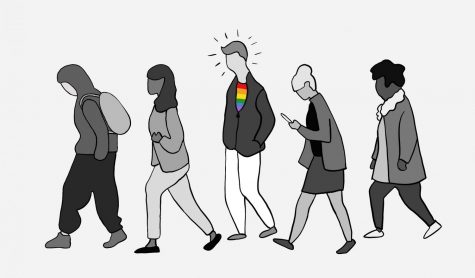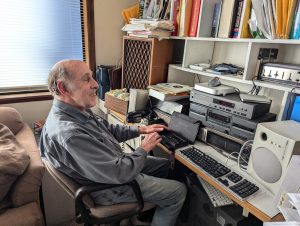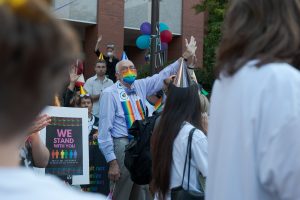Fight to be recognized, to be authentic self
SPU alumni share experiences of being gay on campus
May 28, 2020

For graduates like Patrick Harrison, who attended Seattle Pacific University from 1983-1987, SPU was not only a place where they were not allowed to dance, but also a place in which they could not be their authentic self. In a society and a school where gay individuals were forced to hide in fear of being kicked out or ostracized, Harrison came to terms with who he is.
Harrison characterized the attitude towards LGBTQ+ individuals as being very different from today.
“It was more of a taboo… [the] American Society of Psychologists saw it as a sexual deviancy,” Harrison said in a phone call.
Regardless of the time period, though, what stands out is that, for LGBTQ+ students, the battle was not just to feel welcomed but to express themselves and be recognized by the school they wanted to feel accepted by.
Chris Matsuo, an SPU graduate who attended SPU from 2004-2008, recalled a school that had just years prior finally undone the no-dancing policy but was still deciding how to handle LGBTQ+ issues as a Christian campus.
Harrison recalled the university outcasting those who were openly gay and LGBTQ+ individuals being treated harshly by their peers. Harrison feared being associated with these people in fear of being outed during a time where there was a very serious stigma associated with homosexuality: the onset of the HIV/AIDS epidemic.
“There was only one person I knew that was ‘out’ at that time but he was very flamboyant, very kind of, in your face and I actually kind of pushed him away because I didn’t want to be associated with them, because I didn’t want to be in that category,” Harrison said. “I actually had had a college girlfriend, as well, trying to hide it.”
This fear of being associated with something that he could be shunned for led Harrison to have another fear: being kicked out of the school.
Harrison recalled how during his junior year, two women’s basketball team members were rumored to have been, as he described, “in the same bed together.” It resulted in one girl being forced to leave the school.
“I was afraid of being kicked out of school,” Harrison said. “That was kind of over your head. It was not allowed at school. You would be asked to leave the school.”
Matsuo, a student from the 2000s, still faced challenges decades after Harrison’s time at SPU. This time, though, the struggle was to get LGBTQ+ issues recognized on campus and the recognition for the fledgling club on campus, Haven.
According to Matsuo, on April 11, 2007, an organization called the “Equality Ride” came to campus. This was designed to expose Christian colleges and military schools to the stories of LGBTQ+ students in order to spark dialogue.
While at some colleges, they were turned away or not allowed to host forums, SPU’s administration allowed the “Equality Ride” to speak to a packed forum.
For Matsuo, it had a positive impact on him at the time when he was still grappling with his sexuality.
“That was my first time hearing people [be] open about their sexuality and sharing their stories about what it was like to be gay and Christian,” Matsuo said in a zoom call.
Shortly after, a student came out on the front page of “The Falcon” and Matsuo was opened to a side of campus that still, at this point, did not have a large voice.
“That was huge for me to see somebody willing to say I am at a Christian school and I am a fellow student and here is my story,” Matsuo said. “There was definitely other queer students on campus but most of them were pretty closeted except for a few but I think this was an opening of the door.”
Around this time was also when the club Haven was founded. The road was not easy for Haven as club members had to jump through obstacle after obstacle in order to be recognized.
Despite being given club membership by ASSP, the administration at the time struck down their request. Matsuo described how they were forced to meet off campus and to fight for their club to gain the same recognition of other clubs on campus.
After continual discussion with the administration they were finally able to meet on campus, but were relegated to meeting in public spaces in Weter Hall, and then eventually getting their own dedicated classroom.
Despite these struggles, both Harrison and Matsuo described their time at SPU as just one part of what was a positive growing experience for both of them.
Harrison appreciated that the school gave him a set of principles that would help him grow in a more controlled environment while also giving him opportunities to have multiple leadership roles that connected him to campus, despite the fact that it was not as accepting of him as he may have wanted it to be.
“There was always this underlying ethics and I really appreciated that,” Harrison said. “I just wish it would have been more accepting of me and I wouldn’t have struggled those four or five years … I think I would have been more sure of myself.”
Despite the struggle to be accepted, he described his time at SPU as being integral to his confidence today.
“I think because I went through some of those things where I felt embarrassed and ashamed of who I was, I flipped it and became more confident in myself,” Harrison said.
To Matsuo, despite feeling that he had to hide parts of who he was the first years he was at SPU, the community he found in Haven led him to appreciate his time at SPU.
“My first couple years there, I was holding myself back and those last two years I was coming out and I couldn’t imagine doing it any other place. I feel like it was a healthy and supportive environment for me to be in,” Matsuo said.
Matsuo also described how upon visiting SPU for the retirement party for Professor Regina Schlee he was left aghast at how much SPU had changed and had started to recognize it’s LGBTQ+ students more than it had before. He described a wall in Weter — the “Diversity Timeline” — that outlines the history of SPU and how it has evolved on various issues and saw Stonewall listed as one of the events.
“I remember seeing Stonewall on there and I was shocked because that would have not been posted in a public space when I went there,” Matsuo said. “I was like, ‘wow this school has come a long way.’”
This story is part of a two-part series that deals with how LGBTQ+ issues have evolved on campus over time. Part two, discussing the stories and struggles of current LGBTQ+ students on campus, will be released on June 4.

























































































